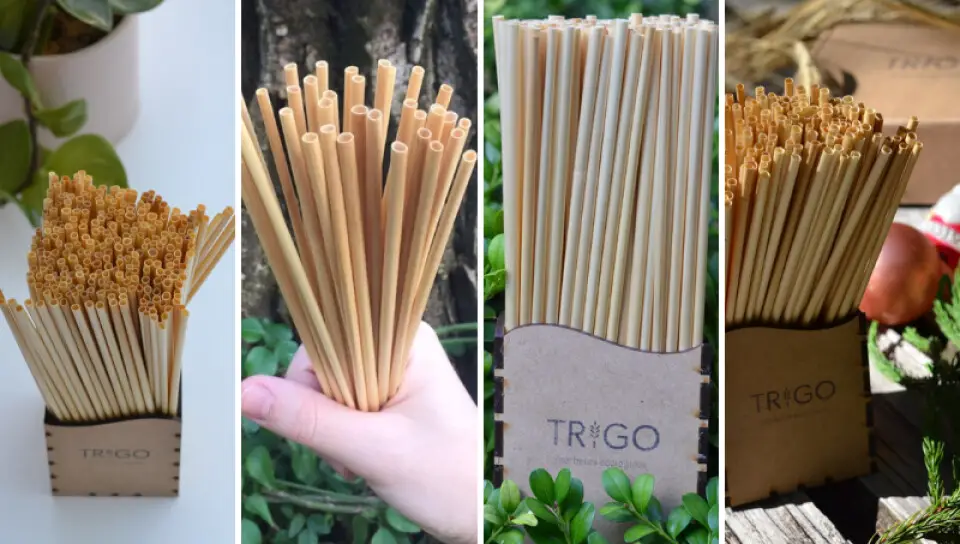There has been a growing concern over plastic pollution and its detrimental effects on the environment. One of the most common single-use plastic items is the drinking straw. While convenient, plastic straws contribute significantly to ocean and land pollution, taking hundreds of years to decompose. In response to this issue, innovative and eco-friendly alternatives have emerged, one of which is the disposable and biodegradable wheat straw.
What Are Wheat Straws?
Wheat straws are a natural, biodegradable, and sustainable alternative to plastic straws. They are made from the stems of wheat plants, which are a byproduct of wheat farming. Traditionally, these stems were discarded or burned after harvesting, but now they can be repurposed into drinking straws, reducing agricultural waste and providing an eco-friendly alternative to plastic.
The Benefits of Wheat Straws
1. 100% Biodegradable and Compostable
Unlike plastic straws, which take hundreds of years to break down, wheat straws decompose naturally within a few months. They can be composted at home or in industrial composting facilities, leaving no toxic residues behind.
2. Zero Waste and Sustainable
Since wheat straws are made from agricultural waste, they do not require additional resources for production. This makes them a sustainable alternative that aligns with circular economy principles by utilizing byproducts that would otherwise go to waste.
3. Chemical-Free and Safe
Many plastic straws contain harmful chemicals such as BPA (Bisphenol A), which can leach into beverages and pose health risks. Wheat straws, on the other hand, are entirely natural and free from harmful substances, making them a safe choice for consumers.
4. Sturdy and Functional
Unlike paper straws, which tend to become soggy and disintegrate quickly, wheat straws are naturally water-resistant and maintain their structure for an extended period. This makes them ideal for both cold and hot beverages.
5. Eco-Friendly Production Process
Producing wheat straws requires minimal processing and energy compared to other alternatives like metal or glass straws. The process involves cleaning, cutting, and sterilizing the wheat stems, ensuring a low environmental footprint.
How Are Wheat Straws Made?
The production of wheat straws is straightforward and eco-friendly. The process typically involves the following steps:
- Harvesting: Wheat stems are collected after the wheat grains have been harvested.
- Cleaning: The stems are thoroughly washed to remove dirt, dust, and any residues.
- Cutting and Shaping: The stems are trimmed to the appropriate length and smoothed at the edges.
- Sterilization: The straws undergo a natural sterilization process using heat or UV light to ensure hygiene and safety.
- Packaging: The final product is packaged in biodegradable or recyclable materials, ready for distribution.
Why Choose Wheat Straws Over Other Alternatives?
There are several biodegradable straw options available, including paper, bamboo, metal, and glass straws. However, wheat straws offer unique advantages:
- More durable than paper straws: They do not become soggy in liquid.
- More sustainable than bamboo or metal straws: They are made from agricultural waste rather than requiring new material cultivation or energy-intensive manufacturing.
- More affordable than glass or stainless steel straws: They provide a cost-effective solution for businesses and consumers looking for a sustainable option.
The Role of Businesses and Consumers in Adoption
For wheat straws to make a significant impact on reducing plastic waste, businesses and consumers must actively embrace this sustainable alternative. Restaurants, cafes, and bars can switch to wheat straws as part of their eco-friendly initiatives. Consumers can also support the transition by choosing biodegradable options and encouraging businesses to make the change.
Disposable and biodegradable wheat straws represent a simple yet effective step toward reducing plastic pollution. By utilizing agricultural byproducts, they offer an eco-friendly, chemical-free, and sustainable alternative to plastic straws. As awareness of environmental sustainability grows, adopting wheat straws can contribute to a cleaner and greener future. Making small changes in daily habits, such as switching to biodegradable straws, can have a significant positive impact on the planet.

